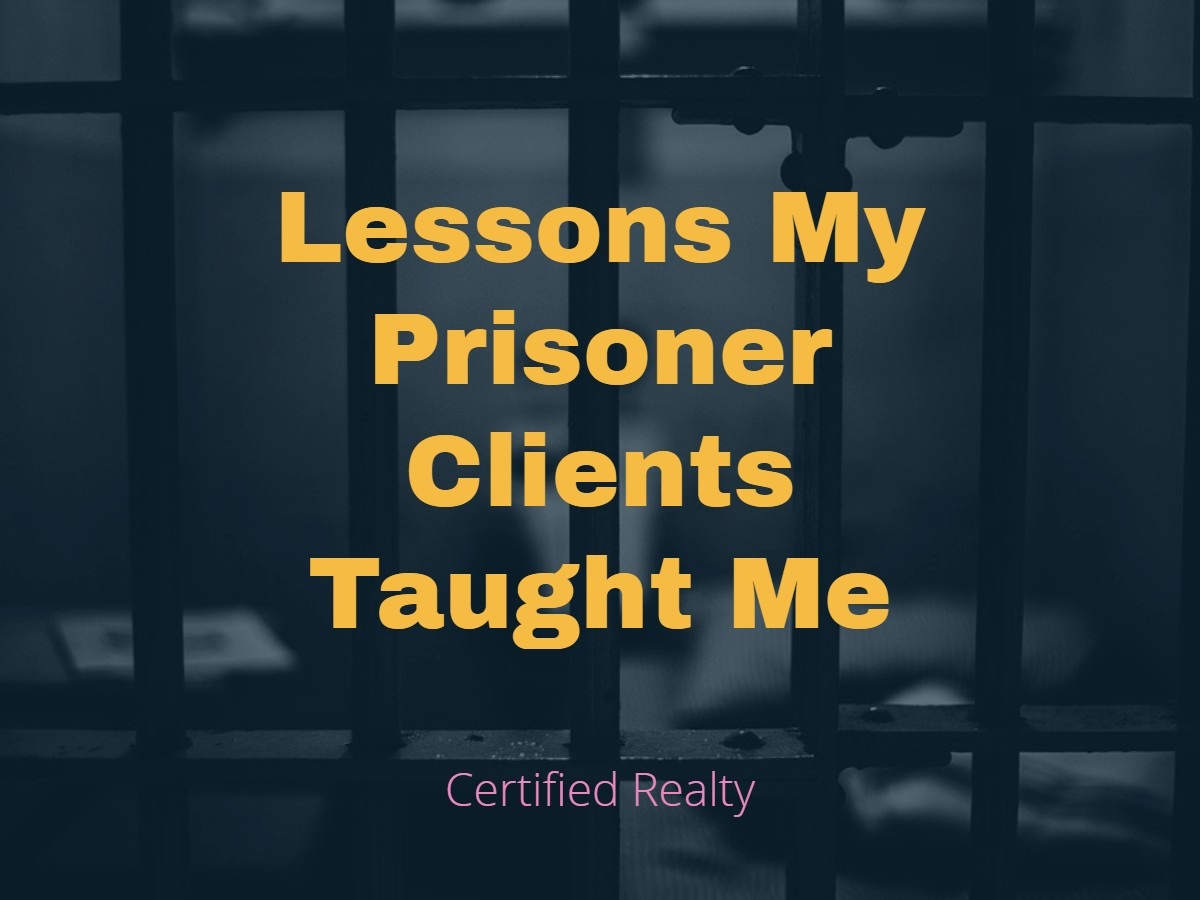
Perhaps you’ve seen TV shows and movies about life behind bars, or read prison-related books. But regardless of the many prison stories in the media, the simple fact is that most people have never been incarcerated. As a result, one common question about prison life is if it’s very much like how it’s portrayed…or is it significantly different?
There are also other questions you may never have considered. Like what happens if you’re selling your home…from prison? In other words, is it possible to sell your house…from the big house? Find out as we go behind the walls of freedom to see what it’s like to work with multiple convicted homesellers. We’ll also learn some life lessons from each convicted homeseller. There’s plenty more, too…in this interesting feature article and real estate podcast!
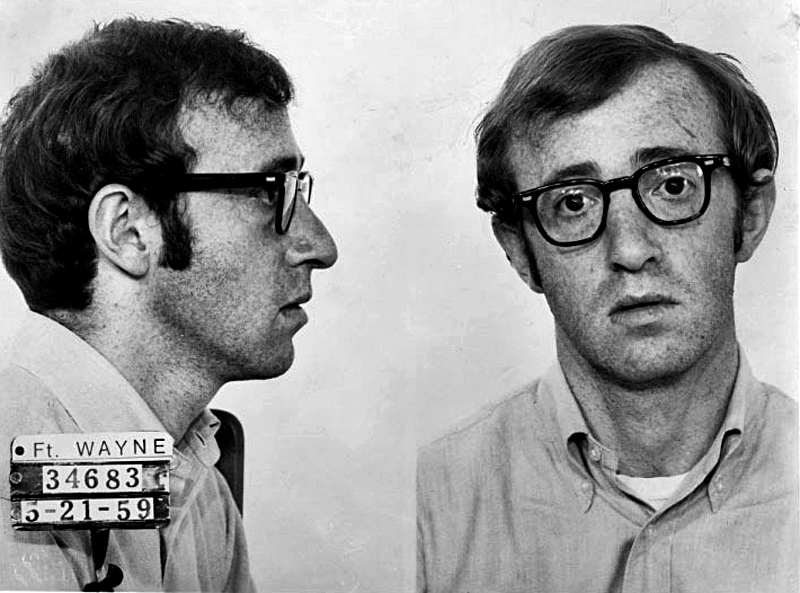
As my 30 year anniversary as a Realtor approached, I began to recount the many clients with whom I’ve worked. After three full decades, the list was long, diverse and there were a lot of great people to remember.
Criminal Clients
I then recalled a few especially unique clients. They weren’t unique because of where they were born, their ages or even what they did for a living. Yet as I reminisced, three particular people I’d worked with collectively came to my mind. I soon realized that each of these clients had one unique trait in common during my interaction with them. All three were incarcerated during my time as their Realtor.
One client was imprisoned for his offenses in a county jail. Another client was incarcerated in a mental ward for felonious acts. And yet another client was serving time in a federal penitentiary. To place this situation in perspective, I never intentionally focused on serving convicted clients. However, after working with literally hundreds of people, it appears I’ve averaged one incarcerated client for each decade. So while these three people represent a minority of my clientele, I learned something from each one of them. Here is that story.

Even Convicts Need A Realtor
The situations and personalities of these three imprisoned clients were different. Yet one thing they all had in common was their need of a Realtor. I’ll change the names to protect their identities, but then as now, working with each of these three clients taught me some things worth remembering. Perhaps that’s one reason why they stood out to me the way they did.
Meet ‘Harry’
Harry and I first met after he called me about a home I’d sold near one of his properties. Harry had lots of insightful questions and was keen on detail, which I eventually attributed to his impressive resume. When he spoke from time to time about his life, it included his being a senior naval officer during WWII. After the war, he became an accountant and a distinguished college professor.
Harry was definitely smart, so you can imagine my surprise when he called me one day and said:
It looks like I’ll be going away for a while, Roy.
Once he explained where he was headed, I was doubly surprised. That’s because while I didn’t know Harry that well and he’d previously intimated having ‘legal problems,’ Harry didn’t seem like someone who would even jaywalk, much less be arrested. I’d also grown up believing prison was only for the most hardened of criminals. Harry seemed pretty meek to me and especially at his age, he just didn’t fit the stereotype.
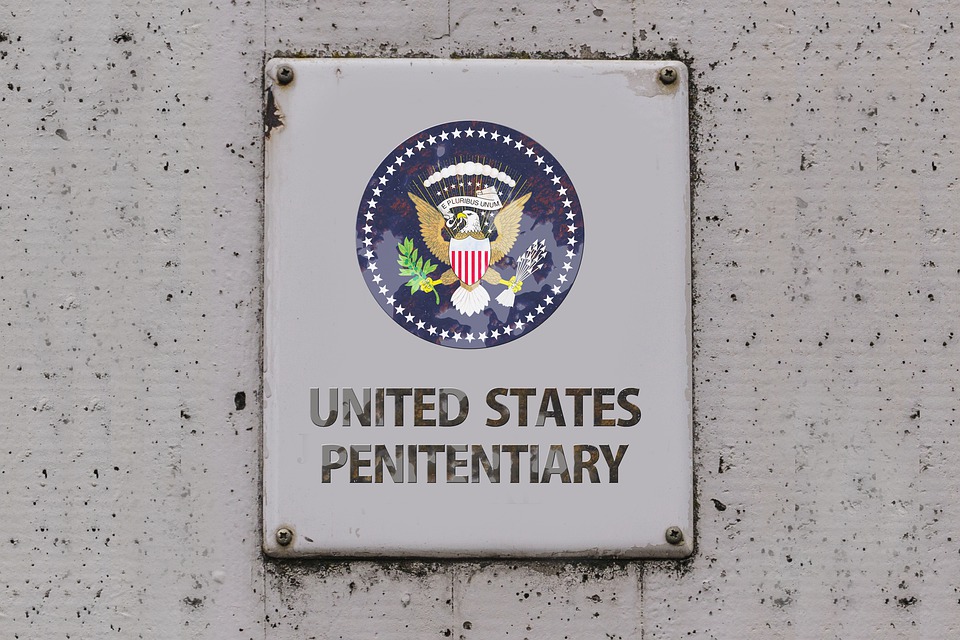
Don’t Fight the Fed
Harry went on to explain that he’d been accused, tried, then convicted of financial crimes by the federal government. While declaring his innocence, in his own words Harry also suggested that he ‘…should have done some things differently.’ One of the ironies of his arrest surrounded the person who put him in handcuffs. Harry said it was one of his former students who later became a federal agent that arrested him.
Because Harry was getting on in years, upon learning of his conviction, a primary concern I had was his vulnerability, being an older person inside prison. Not long after Harry reported to the penitentiary, I spoke with his wife. She mentioned Harry would greatly appreciate a visit. A day or so later as I drove onto federal prison facility grounds, I wondered how Harry was doing. And what should I expect inside a federal prison?
I parked my car in the nearly empty parking lot. The prison was located in a remote area and I was stopping by during the week, so it made sense there weren’t many visitors. I self-consciously walked up to the massive, fortress-like entrance and figured I was being filmed, hoping no one thought I was there for a prison ‘breakout.’ Once they realized I wasn’t bearing a cake that contained a file, I figured anyone who might be watching me could tell I was simply visiting.
Opening a tall door to the cavernous interior, inside I noticed clear, plastic-like shields in front of each teller-like cubicle. I walked up to a far plastic covered window where a man was standing on the other side.
Hi. I’m here to visit Harry Johanson.
Harry who? was the response.
Johanson. The prison worker looked over and scanned a list of names.
There’s no Harry Johanson here. Better try down below.
Down below?
Yeah, minimum security. Over there. He pointed north.
Confused, I nodded. Okay, great. Thanks.
Walking to my car, I pondered. Minimum security. Then THAT must have been maximum security.
I later learned our federal prison system segregates inmates based in part upon the crime they commit. One reason is to minimize predatory violence among inmates. So while Harry was convicted of a federal crime, it wasn’t considered violent, so he was in a very different kind of facility. And sure enough, a few minutes later when I arrived ‘down below,’ I saw nothing at all like my earlier visit ‘up above.’
Approaching the building, I realized not only wasn’t it guarded—It wasn’t even locked. I walked inside to find a completely different atmosphere and wondered: Was this a famed ”Club Fed’ prison I’d read about, where pampered inmates are allowed to more easily serve their sentences?
There was a visitor sign-in sheet on a table near the entrance, which I completed before asking a nearby assistant if I could visit Harry.
Sure, I’ll check, was his response.
As he walked away, I looked through a large glass window into an adjacent room. There, several men talked with their presumed wives and children. One kid played and sat on his dad’s lap. A few minutes later, Harry hailed me over.
Hello, Roy. You made it.
We shook hands.
I said Hi Harry. It’s good to see you. How are you doing?
It could be worse. Would you like to talk where it’s sunnier? he asked.
Sure, that sounds great.

We walked into a courtyard, located within the minimum security structure. As we sat down, I looked at Harry and was struck by the sheer irony. I realized the prison clothes Harry had on looked somewhat like the summer naval officer uniform he probably wore as he served our country during WWII. As we talked, I asked him if they fed him enough and if the stories I’d heard about prison meals being horrible were true.
I really have to watch what I eat here, he said.
Oh, I replied. Is it really that bad?
Not at all, Harry smiled, patting his stomach with both hands. They give us so much food, I’m gaining weight.
How can that be, Harry? I always heard federal prisons were really rough and sometimes fed just bread and water.
Not here, Harry said. This kind of minimum security is where they put folks for white collar stuff. They make sure to keep us away from the violent ones. And it’s the federal system, so they always seem to have enough of what they need.
We talked for an hour or so. During my visit, Harry pointed across the room at a man in his mid-30’s.
See him? He’s a doctor. They got him for writing bad prescriptions. There’s also an attorney here and another accountant, too.
That helped me to get a grasp on what ‘white collar crime’ really meant.
Before leaving, I wished him well, shook his hand and told him I’d stay in touch. In time, his sentence was up. He returned home, to see his disabled wife, kids and grandkids. Harry passed away a few years later, when his family’s most recent memories thankfully weren’t of him behind bars.
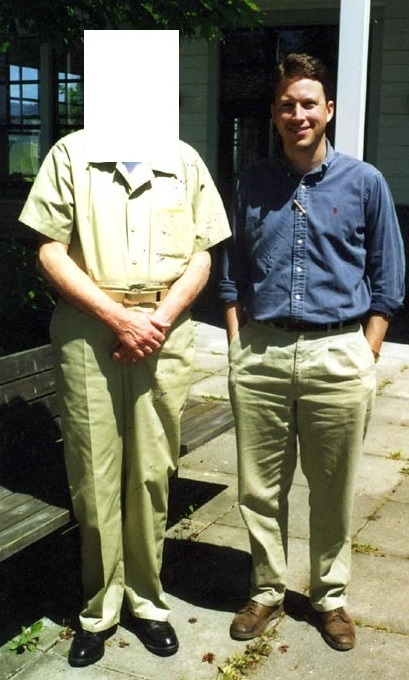
Lessons from Harry
1. Even our most educated and honored citizens can take a wrong turn late in life.
2. No one is immune to missteps, including those with advanced knowledge and much life experience.
3. Family and friends are helpful through a difficult time, especially during separations.
4. While no one—even a veteran—is perfect, those who defend our country still deserve our thanks.

Meet ‘John’
Like Harry, my client John also was a US military veteran. But instead of serving during WWII, John had served in Vietnam. And while I’ve long since forgotten John’s specific crime, he was sentenced to his local county jail instead of a long-term penitentiary, so authorities presumably deemed his level of offense as less severe than Harry’s.
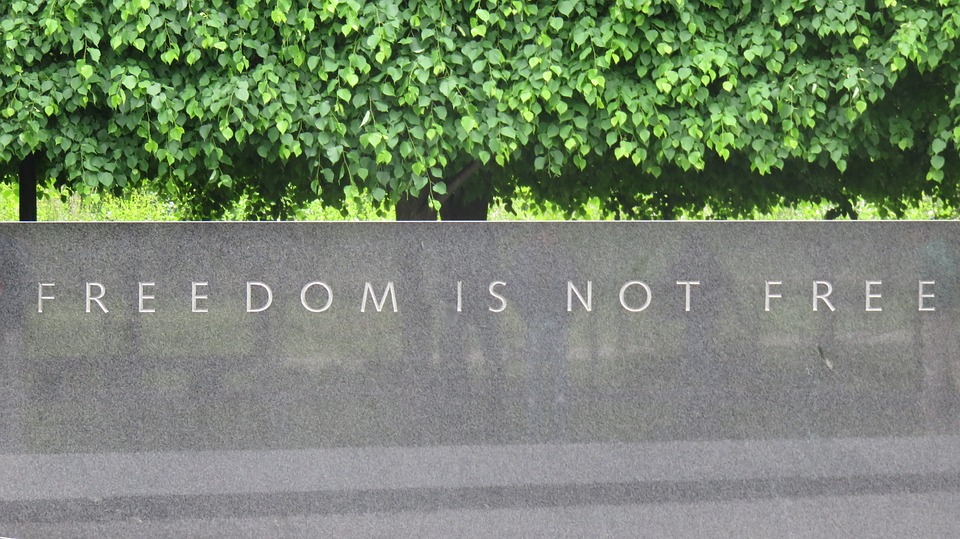
The Irony of Incarcerated Veterans
On the face of one Vietnam Memorial are the words ‘Freedom is not Free.’ Yet it’s not lost on many that correctional institutions house veterans much like John. Reasons sometimes cited for the incarceration of veterans include difficulty adjusting to civilian life and drug use, sometimes in an effort to cope with post-traumatic stress disorder, also known as PTSD. While the number of imprisoned veterans is a minority, to most Americans, one imprisoned veteran is too many.
John’s Jail
John was jailed soon after his house was listed for sale. During the process of selling John’s property, I later tried to meet him in jail so he could review an offer we’d received for it. I was surprised when John’s jailers would not allow me to meet with him so he could review documents that required his signature. Despite repeated attempts to visit the jail, officials there were adamant that the only one John could meet with in person was his lawyer. One possible ‘workaround’ we discussed was for me to hand deliver the necessary documents to John’s lawyer. But because John was using a very busy public defender as his attorney, there were no guarantees when that visit to John in jail might occur.
So I mailed John the necessary document. There was a lengthy wait, both for jail officials to approve the letter for John to see and also for the US postal service to deliver it back using the pre-paid postage envelope I’d provided.

Hard to Reach
During all this, the buyer for John’s house was confused, too, given the delay in John’s response to a good offer. John and I determined that disclosing his whereabouts was likely to lessen his negotiating position, so we simply informed the buyer’s Realtor that the seller was ‘hard to reach.’ In time, I received the required paperwork, thus moving forward our transaction to sell John’s property.
There Are Worse Things Than Jail
Believe it or not, John’s most distressing situation wasn’t in jail. Instead that occurred once he was released. That’s because John was in jail when he learned he had cancer. Treatment was available at the closest Veteran’s hospital. John then told me”
The county was so cheap, that rather than their paying for my ride to the Veteran’s Hospital at county expense, they just released me from jail and let me find my own way there.
I visited John at the Veteran’s Hospital and later attended his funeral, which included a sizable number of Vietnam veterans and bikers, too. There clearly had been a strong bond between John and his friends who were paying their last respects. As an aside, I recall that other than the funeral directors, I was the only person at the service wearing a tie. Yet everyone in attendance shared a common understanding that John’s life mattered.
Lessons from John
1. Some government officials can be pretty heartless…even to an ailing veteran in need of medical treatment.
2. There are worse things in life than jail. Cherish every single day.
3. We don’t know how long we have on this earth, so make the best of it.

Meet ‘Jake’
Like my experience with John, I was in the process of selling Jake’s house when we received an offer on it. I spoke with Jake’s wife to let her know. She said Jake had been arrested and that Jake had been charged with a felony.
The offer on Jake’s house was a good one and once I learned where Jake was, I presumed Jake could use the proceeds from his home sale. Yet in order for us to move forward, I had to get Jake’s signature on the offer. Once Jake’s wife told me where he was, I was surprised. Jake was being held behind bars in a hospital psychiatric ward.
As we spoke, I jotted down the address and hospital wing where Jake could be found. I showed up that same afternoon, documents in hand. Approaching the nurse’s station, I identified myself. The nurse on staff said they were short handed and that I would need to enter the padded cell holding Jake, alone.
You can’t go in with me? I asked.
No. We’re short-staffed right now. But it should be alright, I was told. Just get my attention once you’re ready to go.
The nurse walked me through multiple locked doors before I was escorted into Jake’s cell. Jake appeared clear headed and seemed to understand as I described he had an offer on his property. He then asked a few questions and told me he’d like to sign the offer acceptance. As I handed him the pen, I suddenly wondered about its use as a weapon. My worry was unnecessary, as Jake indeed signed the sales agreement and handed the pen back to me. We talked a few minutes more, before I notified the nurse and was allowed out.
Lessons From Jake
1. Try to expect the best from others, even when they’re in jail.
2. In helping people, sometimes we help ourselves by realizing how much we take for granted.
3. There are people on the margins we don’t always consider, including those with mental illness.

The Big Picture
While it may seem counter-intuitive, being imprisoned perhaps wasn’t the biggest problem these three men had. I’m no therapist, but a key issue seems to be how they dealt with problems. Then by breaking the law, each one of them compounded his troubles. The consequences of lawbreaking then removed each man from whatever support network of family and friends he had, with the resulting isolation and stigmatization creating further desolation and desperation.
In some cases where ‘friends’ are fellow criminals, being removed from an unhealthy environment could be seen as a positive factor. And by dealing with imposed solitude, a case could be made that another possible benefit was that each man was then forced to face their need for change. So the next time we hear about prisoners in the news, it may be helpful to remember that in a way, we’re all one bad decision away from their same fate.

Volunteer Programs
Volunteering is one helpful way to help those ‘on the inside’ and programs are available to assist the incarcerated. Click here for more information and resources associated with the Oregon Prison Project.

Selling Your Oregon Home?
Contact Certified Realty using the convenient form below for a free consultation and find out what your property could sell for in today’s market.